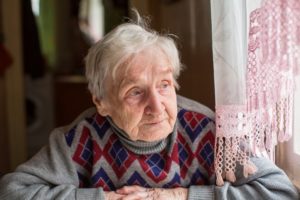Self-Neglect Is an Underreported Type of Elder Abuse

During a visit to their hometown, Dan and Amy visited their great-aunt. Aunt Becky was glad to see them, but they were worried at what they saw in her home. Her usually spotless house was dirty and unkempt. Though she’d always taken pride in her wardrobe, her dress was dirty and torn. She seemed painfully thin, and there was little food in the kitchen. Dan and Amy offered to help, but Aunt Becky firmly told them, “I’m fine!”
Our senior protection agencies work to prosecute and raise awareness of the crime of elder abuse. The public is encouraged to report suspicions of physical, emotional or financial abuse perpetrated against an older adult. Sadly, these crimes often are committed by a person an elder knows, even by a family member.
Neglect is another form of elder abuse. When a person who is in charge of the well-being of a senior fails to provide for their health and safety, that too may be a criminal offense. But self-neglect is a more complicated issue. This is when an elder is unwilling or unable to maintain their own well-bring. The National Adult Protective Services Association (NAPSA) reports that they receive more phone calls about self-neglect than any other form of elder abuse. And the Aging Life Care Association says that 92% of aging life care professionals (also known as geriatric care managers) identified self-neglect as a significant problem in their area—a problem that often goes unreported.
“Studies found that people with fewer economic resources are more likely to experience self-neglect,” reported Dr. XinQi Dong, director of the Institute for Health, Health Care Policy and Aging Research at Rutgers University. “However, some researchers have suggested that self-neglect affects older adults across every education and economic strata.” Physical or cognitive changes and emotional distress may make seniors less able to care for themselves and their home.
The decline may be gradual. Family may notice there’s a problem during visits, or a concerned neighbor might contact them with concerns. Here are some of the signs of self-neglect:
- Unsanitary, cluttered conditions in the home
- Spoiled food in the kitchen
- Neglecting personal hygiene
- Dressing inappropriately for the climate
- Unpaid bills, mail piling up, utilities shut off
- Social isolation and depression
- Weight loss, dehydration
- Trouble managing medications and health appointments
- Family pets not well-cared for
- Dangerous habits, such as leaving the stove on or the front door unlocked.
Experts also warn that these older adults may be faring poorly during the pandemic, suffering from isolation, unable to access food and supplies or to get their vaccines.
What can families do if they think senior loved ones aren’t taking care of themselves?
The laws are different from state to state, and especially if your loved one has Alzheimer’s or other dementia, it might be necessary for you to step in and serve as your loved one’s guardian or in a similar capacity. But remember, even people with memory loss have the right to make their own decisions as long as possible. Here are things to consider:
Before doing anything, evaluate the situation carefully. Older adults who are capable of making decisions about their lives have the right to make them. They might not make lifestyle choices you would make—or even decisions they would have made before their lives were touched by their current illness, cognitive problems or other life changes.
Your loved one may not want your help. Once you decide to step in, it may be that your loved one will eagerly accept assistance. But many seniors prize their independence highly and will resent even well-meaning “interference.” It’s so important to respect your loved one’s sense of autonomy. They may feel that their independence is threatened, which can inadvertently make the situation worse. Few seniors enjoy the role reversal when a child tries to parent them!
It’s better to begin with a conversation. Express your concern, and offer to help. Saying “How can we figure out a way for you to be safer?” is better than “Mom, get your coat—we’re going on a tour of assisted living communities.” Tell your loved one how you feel: “I would sleep a lot better at night if I knew you weren’t likely to trip over all these piles of newspapers.”
Have a family meeting with your parent, siblings and anyone else involved. Call in professionals. Talk to your loved one’s doctor. An aging life care professional can help negotiate sensitive topics among parents and siblings. An elder law attorney can explain your legal and financial options, such as a guardianship or power of attorney.
With your loved one’s participation, find out about resources in the community that can help. If your loved one wants to stay home, arrange for a home safety inspection and necessary adaptations. Locate senior transportation and nutrition programs, and learn about in-home care, senior centers and activities to keep your loved one socially connected. Moving to a supportive living environment, such as an assisted living community, might be the best choice.
If your loved one balks at accepting help or making a change in their living situation, remind them that accepting help can actually increase their independence and ability to do things they want to do, without worrying about day-to-day home maintenance tasks and other chores. And many seniors prefer to receive help from professionals, which preserves their sense of normal relationships with their adult children or other family members.
If the person you’re concerned about isn’t a relative
If you think a neighbor or other elder with whom you have contact is neglecting their own health and safety, contact their family if possible and share your concerns. NASPA also says to contact your local Adult Protective Services (APS) agency if you think a senior is unsafe in their own home. Worried about being a busybody? NAPSA says, “What if you just have a ‘feeling’ about a situation but can’t verify the details? APS workers are professional social workers trained to handle just such a situation. Based on your report, the agency will assess the situation and determine how best to respond.”

